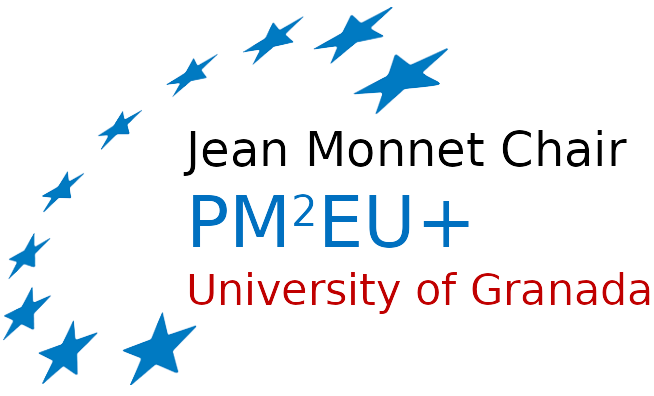The Jean Monnet Chair will provide a radar for the latest research and work related to projectification.
Throughout this website you will be able to find the latest news, works and significant research related to the phenomenon of projectification from all possible viewpoints: management, sociology, psychology, economics, organization, etc.
A brief summary of the main contributions of the work will be presented and the original work will be cited and linked so that everyone can study the work presented in as much depth as they wish.
In this way, the Jean Monnet Chair aims to provide researchers and practitioners with information that will enable them to improve their knowledge of a phenomenon that is already a global reality and that is conditioning and will continue to condition relations between individuals, companies and countries in the future.
Projectification and governance evolution in public sector strategy: A case study of Shenzhen Qianhai mega new town development in China (August, 2025)
The article Projectification and governance evolution in public sector strategy: A case study of Shenzhen Qianhai mega new town development in China explores the intricate relationship between projectification and governance in the public sector, addressing a long-standing gap in the literature. While much has been written about the proliferation of projects as a management mode, far less attention has been paid to how projectification reshapes governance systems over time and across levels. By tracing the fifteen-year trajectory of the Qianhai Mega New Town in Shenzhen, this study demonstrates how public strategies are not simply implemented through projects, but rather become projects themselves, generating cycles of institutional and organizational change.
At the heart of the paper lies the proposition that projectification and governance are mutually reinforcing. Public sector strategies—particularly those of mega new towns in China—are designed, launched, and realized through large portfolios of projects. These projects demand new forms of coordination, accountability, and resource mobilization, which in turn reshape the institutional frameworks and organizational structures responsible for governance. The authors argue that this recursive dynamic can be best captured through the SIOP framework (Strategy, Institution, Organization, Project), a conceptual model they develop from the Qianhai case.
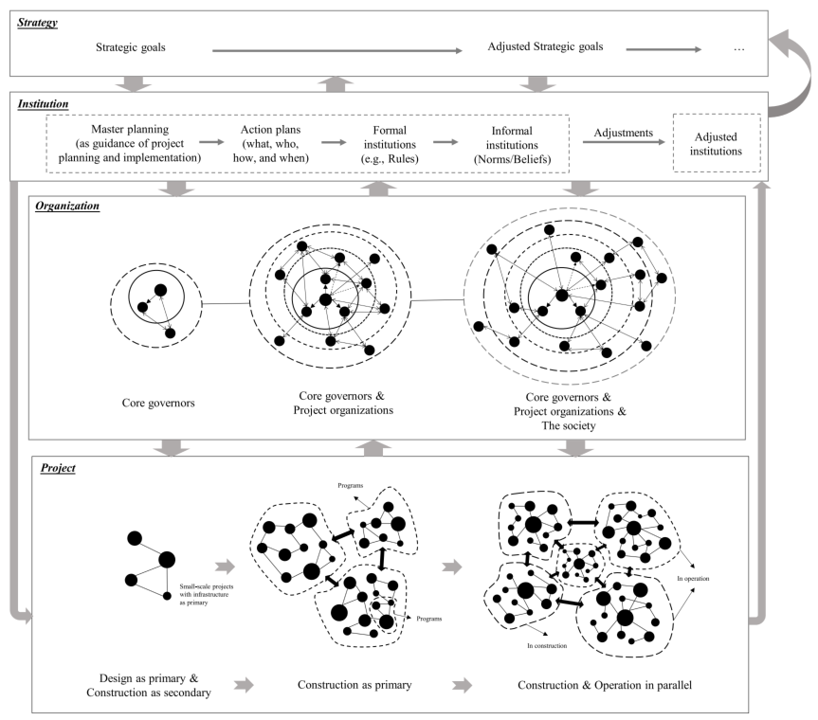
The SIOP framework positions Strategy as the starting point: national and regional visions define the strategic goals that lend legitimacy and direction to projectification. These strategic ambitions then crystallize into Institutions, expressed initially in master plans, regulations, and policies, and later reinforced by informal norms, routines, and shared practices. Institutions set the rules of the game, but they are not static. As projects accumulate, institutions are revised, expanded, or reinterpreted, creating cycles of formal and informal adaptation. Organizations represent the actors that mediate between strategy, institutions, and project execution—ranging from administrative bureaus and state-owned enterprises to temporary headquarters and, eventually, permanent project management offices. Finally, Projects are the concrete vehicles of implementation, operationalizing strategic visions into physical infrastructure, industrial platforms, and urban services. The four dimensions are not linear steps but co-evolving elements, with feedback loops that drive continual governance transformation.
The empirical analysis of Qianhai unfolds in four phases. In the first phase (pre-2010), Qianhai was conceived within national strategies for the Pearl River Delta and Shenzhen’s urban vision. Here, projectification was still largely rhetorical, embodied in high-level planning documents and an initial governance framework that emphasized flexibility and experimentation. The second phase (2011–2013) marked the translation of these visions into detailed project plans and the establishment of a core governance system. The newly formed Qianhai Administrative Bureau and its state-owned development company operationalized a dual structure of strategic oversight and project execution, enabling rapid land preparation and infrastructure works.
The third phase (2014–2020) witnessed an “explosive” growth in project portfolios. Hundreds of infrastructure, industrial, and service projects were launched, accompanied by major governance innovations. Temporary construction headquarters were established to accelerate coordination, third-party professional consultants were engaged to provide technical support, and new enterprises were spun off to manage entire categories of projects across their life cycles. Notably, Qianhai pioneered governance innovations such as the “1.5-level land development” model—temporary, semi-permanent land use that allowed rapid industrial introduction—and partnership-based systems that distributed risks between government and developers. These practices demonstrate the adaptability of governance under conditions of dense projectification.
Finally, the fourth phase (2021–present) marks Qianhai’s transition into a dual-track era, in which construction and urban operations proceed in parallel. The expansion of Qianhai’s territory eightfold necessitated new governance arrangements, bringing in additional stakeholders such as district governments, residents, and service operators. The emphasis shifted from creating physical space to attracting and nurturing high-tech industries, while governance challenges grew more complex: construction now had to coexist with everyday urban operations, raising issues of traffic, noise, and regulatory compliance. This stage highlights the tension between flexibility and institutionalization—while earlier phases thrived on experimentation, the maturing city now requires stronger legal and regulatory frameworks, which can constrain further innovation.
The novel contribution of the paper lies in showing how projectification is not a static state but a dynamic, evolutionary process. The Qianhai case illustrates that governance systems co-evolve with project proliferation, producing new institutions and organizations that outlive individual projects. Temporary bodies become permanent, regulatory innovations are institutionalized, and project knowledge is systematically transferred into governance routines. This cyclical dynamic is precisely what the SIOP framework seeks to capture: a model in which strategies shape institutions, institutions guide organizations, organizations deliver projects, and projects feedback into new strategies, in an ongoing spiral of adaptation.
From a broader perspective, the study advances three key insights. First, it demonstrates that projects can serve as engines of governance reform, not just as tools for policy implementation. Second, it shows that institutional flexibility—often underestimated in state-led systems—can be critical to sustaining long-term strategic initiatives. Third, it identifies the emergence of a hybrid governance model in China’s urban development: neither fully centralized nor fully marketized, but an orchestrated arrangement where the public sector directs, state-owned enterprises execute, and private actors co-produce outcomes.
In conclusion, this research enriches the field of projectification by embedding it within governance debates and offering rare longitudinal evidence from outside Western contexts. The SIOP framework provides both a theoretical lens and a practical tool for analyzing how public sector strategies are translated into projects and how governance adapts over time. While grounded in China’s institutional context, the findings speak more broadly to the challenges of managing complex, multi-level, and long-term projectified strategies in an increasingly uncertain world.
The whole article can be downloaded at https://doi.org/10.1016/j.ijproman.2025.102751
How to cite:
Li, Yongkui & Wang, Mengqi & Ding, Ronggui & Luo, Sheng & Xie, Chunhua. (2025). Projectification and governance evolution in public sector strategy: A case study of Shenzhen Qianhai mega new town development in China. International Journal of Project Management. 43. 10.1016/j.ijproman.2025.102751.
Projectification Evolution (July 2025)
Professors Mattias Jacobsson (Umeå School of Business, Economics and Statistics) and Beata Jałocha (Jagiellonian University) have published the essay “An essay on deprojectification: Drivers and consequences” in the International Journal of Project Management (vol. 43, art. 102693).
Study narrative
In the opening pages, the authors recall that the phenomenon of projectification—the increasing tendency to organise work and society around projects—was first observed in Christophe Midler’s studies of Renault during the 1990s. Yet the pendulum now appears to be swinging back: both critical scholarship and managerial practice show signs of fatigue, and more stable structures are re-emerging. The authors label this countermovement deprojectification: a process of reducing and deinstitutionalising project-based work at different levels (macro, meso and micro).
Theoretical framework
Jacobsson and Jałocha use paradox theory to explain how tensions between flexibility and stability, short- and long-term horizons, and innovation and efficiency can bring deprojectification to the surface once they become “salient.” [A study on deprojectification…] This perspective shows that projectification and deprojectification are not opposites but forces that coexist and alternate as priorities shift.
Drivers of deprojectification
-
Macro level. Grand challenges such as the climate crisis and armed conflicts divert resources toward priority projects and compel other areas to be “deprojectified”; at the same time, management fashions and social demand for secure jobs reinforce permanent structures.
-
Meso (organisational) level. Restructurings, mergers and the quest for long-term efficiency lead organisations to consolidate stable teams and repeatable processes.
-
Micro (individual) level. Burnout and the precarious nature of project contracts prompt many professionals to prefer open-ended employment; in addition, management education now offers more critical, sustainability-oriented perspectives that question the idea that “everything must be a project.”
Expected consequences
The authors foresee benefits such as greater knowledge retention, employee well-being and operational rationality, but they also warn of risks such as loss of agility and innovation and difficulties in financing one-off initiatives. [A study on deprojectification…] They call for empirical studies to measure the depth and duration of these transitions.
Conclusion
The article concludes that deprojectification is above all a dynamic response to persistent paradoxes. The future, they suggest, may lie in “ambiprojectification”—organisations’ ability to pivot nimbly between project-based and permanent modes as circumstances demand.
How to cite the article
Jacobsson, M., & Jałocha, B. (2025). An essay on deprojectification: Drivers and consequences. International Journal of Project Management, 43, 102693. https://doi.org/10.1016/j.ijproman.2025.102693
You can consult the full document at this link: Full article.
Projectification Evolution (June 2025)
Recently, the article "Ten years after: The evolution of projectification in Germany, Norway, and Iceland" by Andreas Wald, Helgi Thor Ingason, and Thordur Vikingur Fridgeirsson was published in the International Journal of Project Management.
The paper analyses the phenomenon of projectification as the the increasing use of projects within organizations as a response to the growing need for innovation and adaptation to environmental changes. This article analyzes the evolution of projectification in Germany, Norway, and Iceland over the past decade. Initially, projectification was studied in Germany in 2013, followed by similar studies conducted in Norway and Iceland. These initial studies revealed that a significant portion of work in these economies was already organized through projects.
The current research replicates this study ten years later, once again measuring the share of project-based work relative to total work in each country. In Germany, the degree of projectification remained stable, being 34.5% in 2022 compared to 34.7% in 2013. Norway, however, experienced a significant increase, rising from 32.6% to 41.9%. Iceland also saw substantial growth, increasing from 27.7% to 34.4%.
These changes in projectification levels can be partially explained by the distinct characteristics of each economy. For example, Norway heavily depends on its highly project-based oil and gas sector, whose economic relevance increased significantly in recent years. Iceland, on the other hand, diversified its economy notably into sectors such as tourism, aquaculture, and renewable energy, activities that favor project organization.
Besides measuring the degree of projectification, the article also examines how predominant project types have evolved (internal versus external). There was a slight increase in external or commissioned projects, but most projects remained internal. In Germany, external projects increased from 16% to 22%, being particularly significant in sectors like construction.
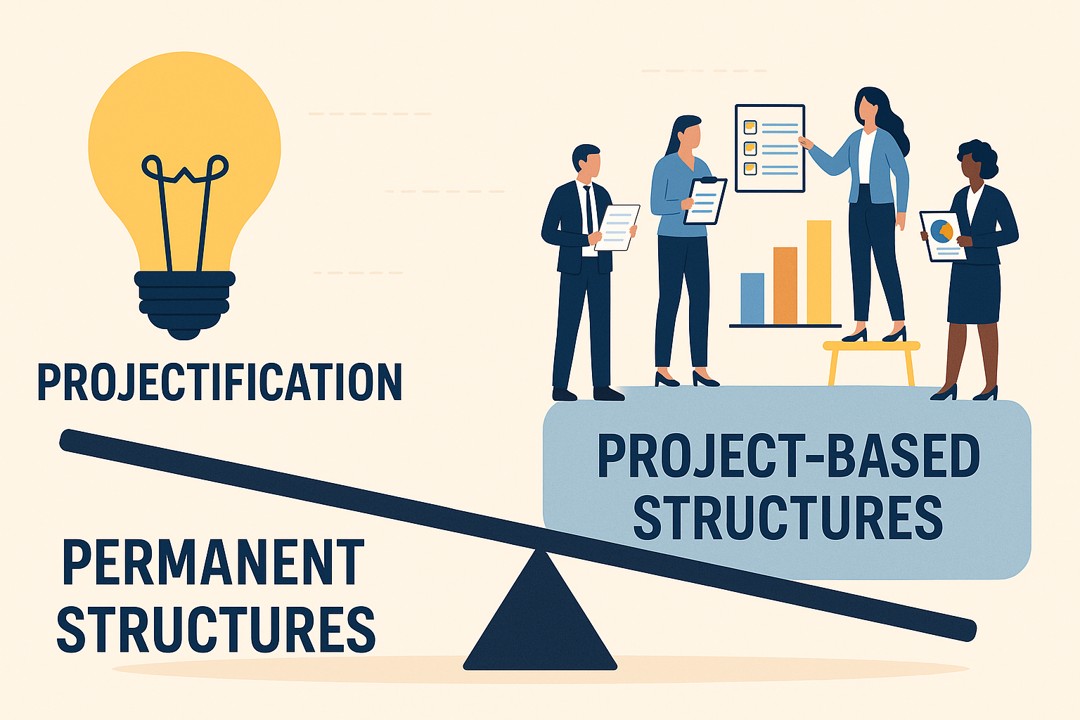
Another aspect analyzed is whether the high degree of projectification corresponds with greater professionalization in project management, specifically through centralized organizational structures (such as Project Management Offices, PMOs) and dedicated project career models. In Germany, although nearly half of organizations have a centralized structure, this number decreased compared to the initial study (from 65% to 49.7%), suggesting possible de-professionalization or changes in organizational structure.
Regarding specialized project career models, the results indicate moderate adoption levels. Generally, few companies offer clearly defined and dedicated career paths for project roles, suggesting significant room for improvement in professionalization.
Finally, although the findings underscore the continued importance of project-based work, they also suggest that a plateau might have been reached in some sectors. This is interpreted as reflecting a necessary balance between permanent structures for repetitive tasks and temporary project-based structures for innovative and unique tasks.
In conclusion, the study confirms the persistent relevance of project-based work in developed economies. However, it also reveals that such projectification is not always fully accompanied by professionalized project management, highlighting important areas for future research and organizational improvement.
Further information:
Wald, A., Fridgeirsson, T. V., & Ingason, H. T. (2025). Ten years after: The evolution of projectification in Germany, Norway, and Iceland. International Journal of Project Management, 43(2), 102696. https://doi.org/10.1016/j.ijproman.2025.10269
Project Management 2030: Are we prepared for what is coming? (May 2025)
On May 10, the Creative Campus of the Universidad Europea hosted a day that was much more than a professional meeting. It became a space for collective reflection on the present and, above all, on the immediate future of project management. The title: Project Management 2030: Are we prepared for what is coming?
The initiative, promoted by Ángel Águeda, CEO of Evergreen, was born with the intention of bringing together professionals and experts to think and share ideas about the direction of the discipline. His role as the driving force behind the event was key to generating an open environment in which reflection, the exchange of experiences and constructive questioning prevailed.
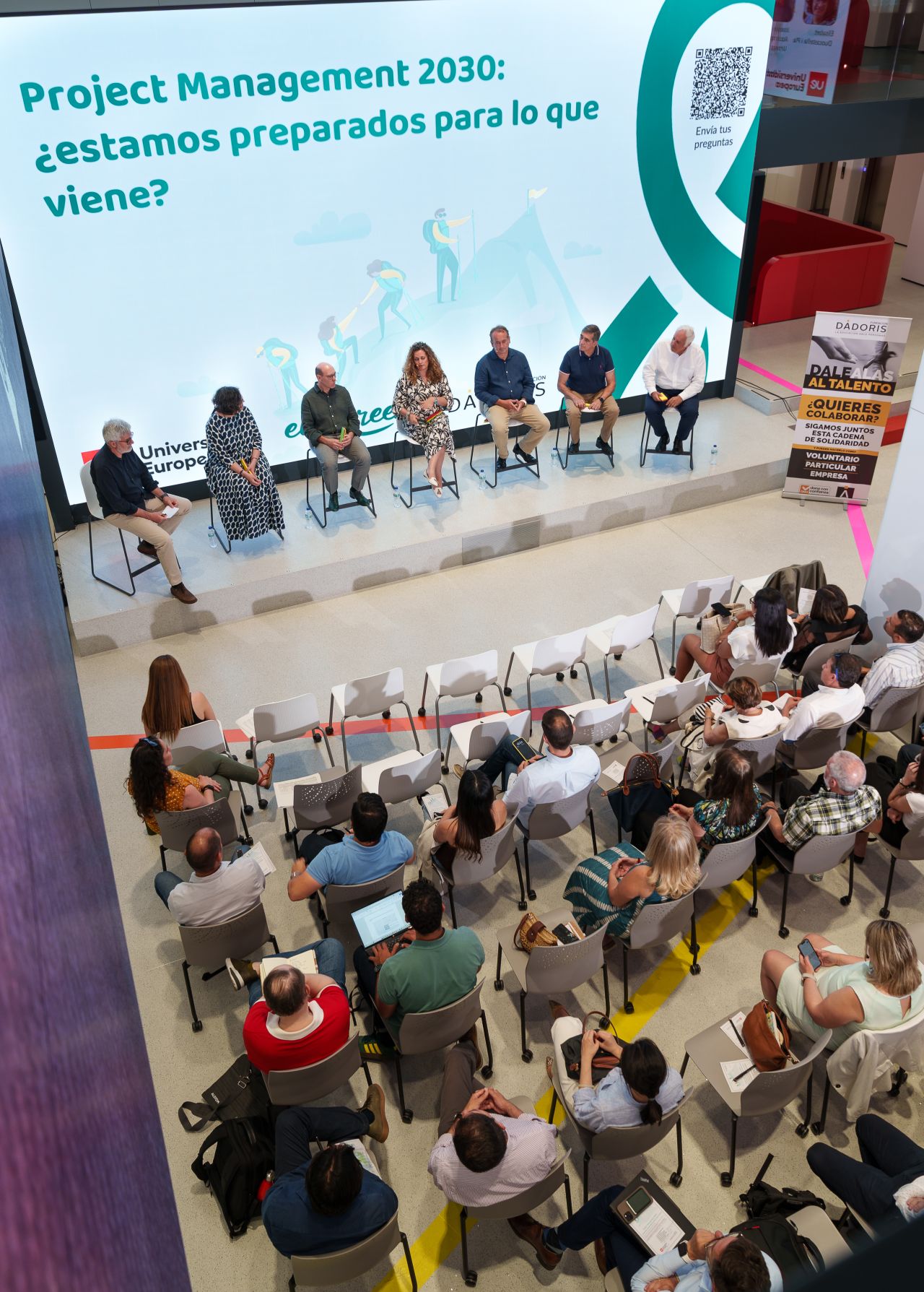
The meeting addressed issues that invite us to rethink the strategic value of project management, beyond its operational dimension. It was emphasized that there is still a lack of awareness of the fundamental role that this profession plays in the transformation of organizations and, by extension, of society.
Among the most salient ideas, the importance of believing in the value of the profession as a prerequisite for its proper projection was underlined. The need to maintain a lifelong learning attitude was also emphasized: learning, unlearning and relearning were identified as key competencies for effective adaptation to constantly changing contexts.
The event also provided an opportunity to question inertias and review the tools and methodologies usually employed. The value of simplicity was defended as an expression of technical maturity and the ability to generate impact from the essential, leaving behind superfluous elements. It was also encouraged to maintain a receptive attitude towards new ideas, regardless of their origin, and to take advantage of each project as a space for practical learning.
The Jean Monnet PM2EU Chair was very positive about the initiative and expressed the desire to collaborate actively in future editions. It was also recognized the importance of promoting this type of meetings that articulate knowledge, practice and strategic vision.
In this context, the role that universities can play in the continuous training of professionals was also highlighted. A function that must be assumed in close collaboration with professional associations and groups, whose contributions are essential to guarantee training that is connected with reality.
In short, the conference on May 10 left multiple messages that invite deep reflection and active commitment to a profession that not only manages tasks, but also helps to make things happen, to turn ideas into realities and to ensure that these realities generate impact.
Undoubtedly the speakers shone at great heights, demonstrating not only passion but knowledge of project management. They were: Joaquín Azcárraga Urteaga, PMP, PMI-ACP Alfonso Bucero, Ph.D, PMP, PMI-RMP, PfMP, PMI Fellow, Elisabet Duocastella i Pla ,José Daniel Esterkin, M. Socorro Garcia Cascales, Antonio Nieto-Rodriguez
Click on the image to watch the video:
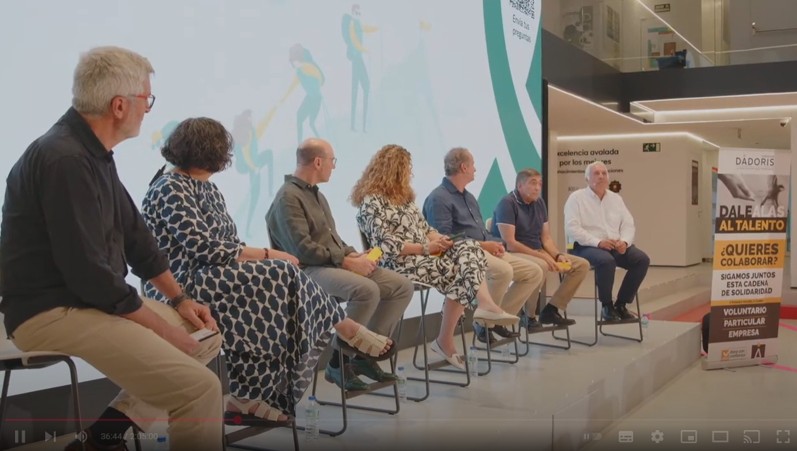
New International Paper about Projectificaction Phenomenon (April 2025)
As part of the work carried out by the Chair, a new article has been published, entitled "Challenges of projectification in an engineering school: Lessons learned and room for improving the whole performance of the institution" journal Social Sciences & Humanities Open.
Claudette El Hajj, Germán Martínez Montes
Abstract:
The management model in higher education institutions is in continuous change: from an initial hierarchical and functional organization, the subsequent influence of the New Public Management model and more recently project-based management, conditioned among other causes by how a large part of the financing of universities (programs and projects) is being articulated. This management model affects all the activities carried out by universities, particularly teaching and research, as well as the way staff must perform their functions. Like all models, project-oriented management has its opportunities and challenges. This paper examines the implications of project-based learning in the university environment. To explore this topic, the authors conducted a case study involving an engineering school in the Middle East and developed semi-structured interviews. This approach allowed the examination of how academic professionals perceive the increasing trend of projectification across six areas: Teaching and Curriculum, Research and Funding, Doctoral Studies, Administration and Governance, Academic Professional Development, and the overall University Culture. The results reveal that, although projectification benefits the institution in general, it is accompanied by a series of negative implications that affect both individuals and the management. The complexity and the different missions and values of universities highlight the need for a nuanced approach to project management to optimize management without jeopardizing academic excellence, especially in the field of teaching and research. Academic staff is not exempt from the need for permanent training, and it is necessary to incorporate project management and its principles to capacity-building programs to ensure their best performance.
The full version is available and can be accessed via the following link: https://www.sciencedirect.com/science/article/pii/S2590291125002153
Margrét Eva Sigurðardóttir's Thesis
- "Projectification within the Icelandic economy and the major industrial sectors".
- Master of Science (M.Sc.) in Engineering Management Reykjavík University.
- June 2024.
This thesis examined the phenomenon of projectification within the Icelandic economy, with the aim of providing a comprehensive understanding of the extent to which projectification is evident in various economic sectors in Iceland.
Additionally, it examined industry-specific differences and what underlying factors possibly contribute to these disparities. Furthermore, the thesis explored potential relationships between key financial aspects and the degree of projectification, on both a company level and an economic sector level. Projectification within the Icelandic economy has been increasing since first measured in the previous study from 2014. The share of project work in 2022 was found to be 34,9% of total working hours. The trend of increasing projectification is anticipated to continue in future years, forecasted to reach 39,3% in 2027.
The growth in project work will vary between economic sectors, as some have now reached a level of saturation with their project work. These results support the previously held assumption that the share of project work in advanced economies seems to be about one third, along with the commonly held assumption of an increasing projectification of the entire economy. The prevalence of projects varies significantly between economic sectors due to differences in industry dynamics, organisational structures and project requirements.
Some sectors rely heavily on project-based work while others have much lower levels of project involvement due to the nature of their operations. However, it is evident that the vast majority of projects are internal projects, rather than the more prominent and visible external projects. Possible relationships between key financial aspects and projectification were explored at both a company level and economic sector level. Although only a few relationships were discovered in this thesis, many others may still be undiscovered.
As very limited research has been conducted on this area, further examination and research are still needed to gain a better and more comprehensive understanding of the topic. There are several complications and limitations of the study to consider. An important limitation is the low number of fully completed questionnaires received from the study sample. This resulted in too few responses representing both the economic sectors and the entire economy of Iceland.
Therefore, the results obtained from the organisations that participated in the study might not adequately reflect the overall share of project work within these sectors. Another limitation lies in the accuracy and precision of the data obtained by the survey, due to human judgement.
Full text link:
https://skemman.is/bitstream/1946/47686/1/MSC-MARGRE%cc%81T-EVA-2024.pdf
María Magdalena Aguilar Velasco's Thesis
- "Navigating the Dark Side of Projectification: Strategies and Resources Shaping the Overall Well-being of Project Workers".
- Ph.D. programme at the School of Business and Law, specialization in International Business. University of Agder - Kristiansand, Norway.
- August 2024.
She has developed an amazing and ambitious research to clarify the dark side components of the projectification phenomenon. Her dissertation aims to enhance conceptual and empirical knowledge of the negative aspects of projectification, their detrimental consequences for individual project workers' psychological well-being and job performance, and how project workers can mitigate and adequately cope with project work challenges and job strain symptoms.
Main conclusions
We encourage all readers to review the original research document detailed below, as the author has done a very extensive and thorough job and only a few of the ideas and conclusions of the research are presented here.
- The literature on negative aspects of project work and their consequences for individual project workers has increased considerably over the past two decades. These studies are predominantly from developed nations, published in project management journals, and based on quantitative, cross-sectional designs.
- Environmental resources, such as workplace and family support, and PsyCap play crucial roles in preventing and mitigating the negative aspects of project work, thereby averting potential detrimental consequences for individual project workers and organizations.
- project workers who employ adaptive coping strategies are “active agents” who strategically put self-prioritization and self-regulation at the core of the coping process to pursue specific goals, resist impulses or temptations, and achieve greater long-term utility, as previous research has emphasized.
- these project workers are proactive and highly resilient agents who use self-initiated job-crafting tactics such as negotiating workloads and deadlines, building strategic relationships, and refocusing on their professional growth to anticipate future common stressors and proactively overcome them.
- By contrast, early-career employees, frontline employees, and those with perfectionistic tendencies tend to use more maladaptive coping strategies, such as workaholic behaviours, passive acceptance, self-blame, work-related rumination, and avoidance behaviours (e.g., quitting). These project workers appear to be “constrained agents” who are limited by the structural conditions of their jobs, their acceptance of the temporary organization, and the masculine work culture of project work.
- Participants who report using adaptive coping strategies, such as job crafting, seeking instrumental support, voice behaviour, positive cognitive reframing, and PVM, possess crucial coping resources that empower them to proactively employ these strategies. Thus, both environmental and personal resources are essential for project workers to cope effectively, particularly in multi-project settings.
Reference and full text link:
Aguilar Velasco, M. M. (2024). Navigating the Dark Side of Projectification: Strategies and Resources Shaping the Overall Well-being of Project Workers [Doctoral Dissertation]. University of Agder.
https://uia.brage.unit.no/uia-xmlui/handle/11250/3137982?locale-attribute=en

